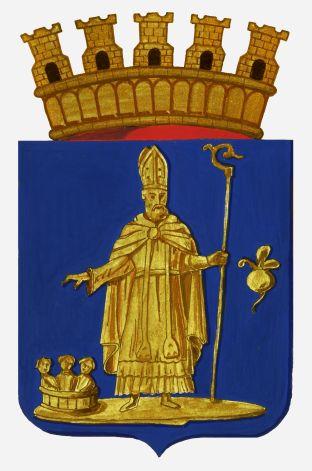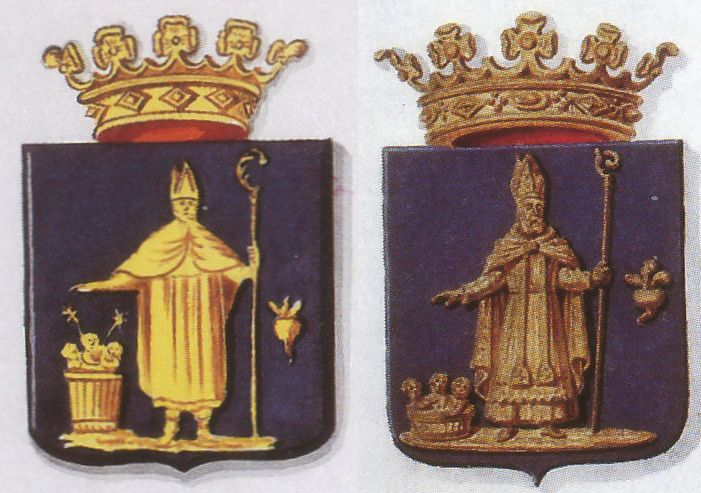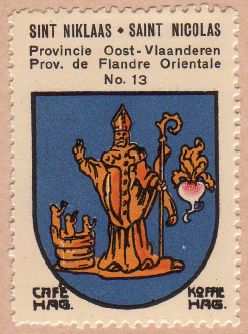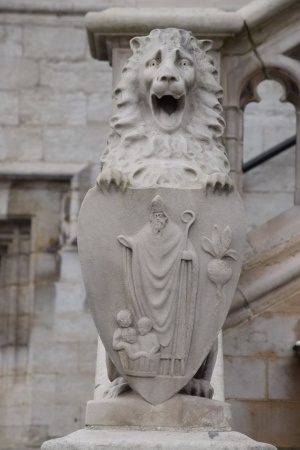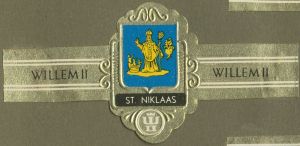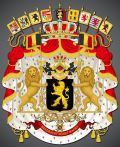Sint-Niklaas
SINT-NIKLAAS
Province : Oost-Vlaanderen
Additions : 1977 Belsele, Nieuwkerken-Waas, Sinaai
Official blazon
- (1819) Van lazuur beladen met den Heiligen Nicolaas van goud, het schild gedekt met ene kroon van goud.
- (1840)Een blaeuw veld, met het gulden beeld van Sint-Nicolaes, vergezeld ter linker zyde van eene raep met gulden bladeren, het wapen gedekt met eene gouden kroon.
- (1980) In lazuur een Sint-Nicolaas vergezeld rechts van een kuip waarin drie kinderen, op een losse grond, en links van een raap, alles van goud. Het schild getopt met een stedekroon met vijf torentjes van goud.
Origin/meaning
The arms were granted in 1819, confirmed on March 27, 1840 and re-granted on December 9, 1980.
The arms show St. Nicholas, the patron saint of the city. Even though it is expected that the city had seals already in the 16th century, the oldest known seal dates from 1616. The seal also showed the patron saint and the beet.
| The arms from 1819/1840 |
After the mergers in 1977 the arms were re-granted, but now with a mural crown as an indication of the long history of the city.
Besides the saint is the beet of the Waasland area. The history of the beet is the following :
Emperor Charles V once visited the city of Sint Niklaas and obviously a crowd gathered to see the emperor. Among these was a small farmer holding a huge beet, which he wanted to hand to the emperor. The guards, however, prevented the farmer to reach the emperor. The emperor, however, noticed that something was happening and asked the farmer what he had in his hands. The farmer answered that he had a giant fruit and that he wanted to give it to the emperor. The emperor was intrigued and let the farmer pass the guards. The emperor accepted the beet and awarded the farmer with a large purse.
Seeing the reward for a simple beet, a local horsebreeder imagined the award he would fetch if he gave the emperor a good horse. So he offered the emperor a beautiful horse. The emperor responded, saying that for a beautiful horse, he would donate one of his precious possessions, and handed the breeder the beet. Embarrassed the breeder had to accept the beet, which ever since has been the symbol of the Waasland and its fertile soil.
The beet also formed part of the arms of Bazel, Lokeren, Moerbeke, Sinaai, Sint-Gillis-Waas, Sint-Pauwels, Tielrode and Waasmunster
The colours are the Dutch national colours, as in 1813 the mayor applied without indicating the colours. The arms were thus granted in the national colours. When the arms were confirmed after the Belgian independence, the colours were not changed.
| The arms in the Koffie Hag/Café Hag albums +/- 1930 |
The arms on a police badge (source) |
| The arms in the town (image Derek Howard) |
The arms in the town (image Derek Howard) |
| The arms on a Dutch Willem II cigar band |
Literature: Servais, 1955
Belgium heraldry portal
This page is part of the Belgium heraldry portal |
Heraldry of the World |
|
Civic heraldry:
|
Other heraldry: |
Contact and Support
Partners:
Your logo here ?
Contact us
© since 1995, Heraldry of the World, Ralf Hartemink 
Index of the site
